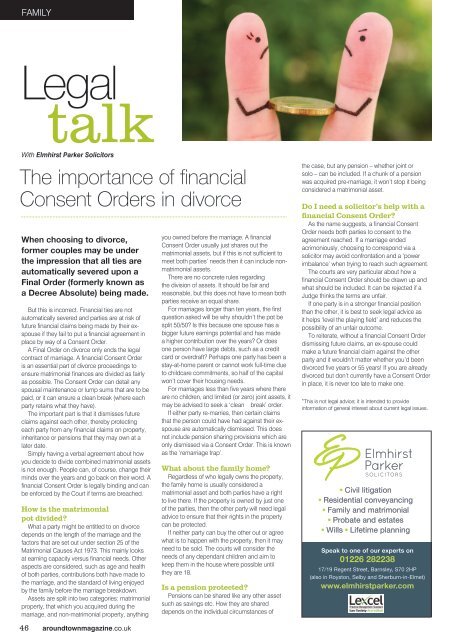Aroundtown Magazine May June 2023 edition
Read the May/June edition of Aroundtown Magazine, South Yorkshire's free premier lifestyle magazine.
Read the May/June edition of Aroundtown Magazine, South Yorkshire's free premier lifestyle magazine.
You also want an ePaper? Increase the reach of your titles
YUMPU automatically turns print PDFs into web optimized ePapers that Google loves.
FAMILY<br />
Legal<br />
talk<br />
With Elmhirst Parker Solicitors<br />
The importance of financial<br />
Consent Orders in divorce<br />
When choosing to divorce,<br />
former couples may be under<br />
the impression that all ties are<br />
automatically severed upon a<br />
Final Order (formerly known as<br />
a Decree Absolute) being made.<br />
But this is incorrect. Financial ties are not<br />
automatically severed and parties are at risk of<br />
future financial claims being made by their exspouse<br />
if they fail to put a financial agreement in<br />
place by way of a Consent Order.<br />
A Final Order on divorce only ends the legal<br />
contract of marriage. A financial Consent Order<br />
is an essential part of divorce proceedings to<br />
ensure matrimonial finances are divided as fairly<br />
as possible. The Consent Order can detail any<br />
spousal maintenance or lump sums that are to be<br />
paid, or it can ensure a clean break (where each<br />
party retains what they have).<br />
The important part is that it dismisses future<br />
claims against each other, thereby protecting<br />
each party from any financial claims on property,<br />
inheritance or pensions that they may own at a<br />
later date.<br />
Simply having a verbal agreement about how<br />
you decide to divide combined matrimonial assets<br />
is not enough. People can, of course, change their<br />
minds over the years and go back on their word. A<br />
financial Consent Order is legally binding and can<br />
be enforced by the Court if terms are breached.<br />
How is the matrimonial<br />
pot divided?<br />
What a party might be entitled to on divorce<br />
depends on the length of the marriage and the<br />
factors that are set out under section 25 of the<br />
Matrimonial Causes Act 1973. This mainly looks<br />
at earning capacity versus financial needs. Other<br />
aspects are considered, such as age and health<br />
of both parties, contributions both have made to<br />
the marriage, and the standard of living enjoyed<br />
by the family before the marriage breakdown.<br />
Assets are split into two categories: matrimonial<br />
property, that which you acquired during the<br />
marriage, and non-matrimonial property, anything<br />
you owned before the marriage. A financial<br />
Consent Order usually just shares out the<br />
matrimonial assets, but if this is not sufficient to<br />
meet both parties’ needs then it can include nonmatrimonial<br />
assets.<br />
There are no concrete rules regarding<br />
the division of assets. It should be fair and<br />
reasonable, but this does not have to mean both<br />
parties receive an equal share.<br />
For marriages longer than ten years, the first<br />
question asked will be why shouldn’t the pot be<br />
split 50/50? Is this because one spouse has a<br />
bigger future earnings potential and has made<br />
a higher contribution over the years? Or does<br />
one person have large debts, such as a credit<br />
card or overdraft? Perhaps one party has been a<br />
stay-at-home parent or cannot work full-time due<br />
to childcare commitments, so half of the capital<br />
won’t cover their housing needs.<br />
For marriages less than five years where there<br />
are no children, and limited (or zero) joint assets, it<br />
may be advised to seek a ‘clean break’ order.<br />
If either party re-marries, then certain claims<br />
that the person could have had against their exspouse<br />
are automatically dismissed. This does<br />
not include pension sharing provisions which are<br />
only dismissed via a Consent Order. This is known<br />
as the ‘remarriage trap’.<br />
What about the family home?<br />
Regardless of who legally owns the property,<br />
the family home is usually considered a<br />
matrimonial asset and both parties have a right<br />
to live there. If the property is owned by just one<br />
of the parties, then the other party will need legal<br />
advice to ensure that their rights in the property<br />
can be protected.<br />
If neither party can buy the other out or agree<br />
what is to happen with the property, then it may<br />
need to be sold. The courts will consider the<br />
needs of any dependant children and aim to<br />
keep them in the house where possible until<br />
they are 18.<br />
Is a pension protected?<br />
Pensions can be shared like any other asset<br />
such as savings etc. How they are shared<br />
depends on the individual circumstances of<br />
the case, but any pension – whether joint or<br />
solo – can be included. If a chunk of a pension<br />
was acquired pre-marriage, it won’t stop it being<br />
considered a matrimonial asset.<br />
Do I need a solicitor’s help with a<br />
financial Consent Order?<br />
As the name suggests, a financial Consent<br />
Order needs both parties to consent to the<br />
agreement reached. If a marriage ended<br />
acrimoniously, choosing to correspond via a<br />
solicitor may avoid confrontation and a ‘power<br />
imbalance’ when trying to reach such agreement.<br />
The courts are very particular about how a<br />
financial Consent Order should be drawn up and<br />
what should be included. It can be rejected if a<br />
Judge thinks the terms are unfair.<br />
If one party is in a stronger financial position<br />
than the other, it is best to seek legal advice as<br />
it helps ‘level the playing field’ and reduces the<br />
possibility of an unfair outcome.<br />
To reiterate, without a financial Consent Order<br />
dismissing future claims, an ex-spouse could<br />
make a future financial claim against the other<br />
party and it wouldn’t matter whether you’d been<br />
divorced five years or 55 years! If you are already<br />
divorced but don’t currently have a Consent Order<br />
in place, it is never too late to make one.<br />
*This is not legal advice; it is intended to provide<br />
information of general interest about current legal issues.<br />
• Civil litigation<br />
• Residential conveyancing<br />
• Family and matrimonial<br />
• Probate and estates<br />
• Wills • Lifetime planning<br />
Speak to one of our experts on<br />
01226 282238<br />
17/19 Regent Street, Barnsley, S70 2HP<br />
(also in Royston, Selby and Sherburn-in-Elmet)<br />
www.elmhirstparker.com<br />
46 aroundtownmagazine.co.uk
















